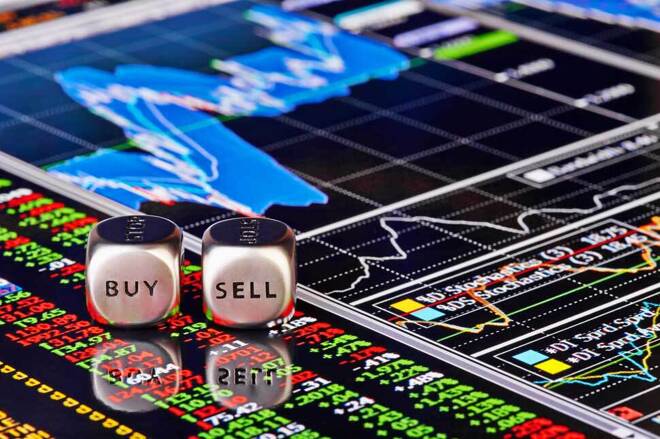Advertisement
Advertisement
March madness could be in store for markets after a somber February
By:
By Naomi Rovnick and Dhara Ranasinghe LONDON (Reuters) - March madness? After a euphoric January was followed by a somber February, with bonds and equities selling off as strong data renewed rate-hike bets, more wild swings could be next for world markets.
By Naomi Rovnick and Dhara Ranasinghe
LONDON (Reuters) – March madness? After a euphoric January was followed by a somber February, with bonds and equities selling off as strong data renewed rate-hike bets, more wild swings could be next for world markets.
U.S. 10-year Treasury yields are poised to end February roughly 40 basis points higher over the month, their biggest monthly jump since September. Across Europe, bond yields, which move inversely to prices, are near multi-year highs.
The S&P 500 index is down around 2% after January’s 6% jump and equities have broadly weakened across geographies and investing styles, with little clear direction.
In short, uncertainty over the future path of the global economy and interest rates remains high.
If data remains resilient the sell-off driven by expectations of more rate tightening could continue.
But if emerging signs that inflation and growth are slowing are strong enough to trigger a pause, asset prices could swing back up, with volatility in between if data signals are not clear.
In a potentially bearish signal for stocks, where valuations are underpinned by bond yields, the MOVE index, which measures expected volatility in the $24 trillion Treasury market, has risen more than 20% in February in its largest monthly jump since June 2022.
Investors felt confident in January that an economic slowdown would encourage rate setters to pause after a series of aggressive rate hikes to curb inflation, however strong data since then challenged that view.
February falls https://fingfx.thomsonreuters.com/gfx/mkt/dwvkdzzylpm/Pasted%20image%201677577888879.png
Data on Friday showing a key inflation U.S. gauge accelerated last month stoked rate hike bets. Some economists reckon the Federal Reserve may even opt for a big 50 bps rate increase in March after a 25 bps rise in February.
“Investors have taken stock of the fact that central banks are telling us that inflation will come back to target later than would be liked and that means rates are higher for longer,” said Guy Miller, chief market strategist at Zurich Insurance Group.
Back to earth
Stocks are still up slightly on the year, but have been pulled back by the return of rate-hike jitters.
MSCI’s broad index of emerging market stocks has slumped 6.3% this month after gaining almost 8% in January.
Growth stocks tracked by MSCI’s index of mainly technology companies, which do well when interest rates are low, are 1.7% lower in February. MSCI’s index of value shares, cyclical businesses offering high dividend yields that appeal when interest rates are rising, is down 2.4%.
European data meanwhile has added to a sense that growth is holding up, with a key measure of euro zone business activity at nine month highs.
As a result, investors are re-examining their soft landing scenario and worry that central banks could tighten monetary conditions too much in response to good data, triggering a deep recession.
“The economic data is starting to trend back upwards again but in a longer term sense this means good news is bad news, because central banks have a lot more work to do,” said Trevor Greetham, head of multi-asset at Royal London Asset Management.
Deutsche Bank strategist Jim Reid warned that most of the impact of rate increases major central banks embarked on in late 2021 was yet to come. It is “not until year 2 onwards of the hiking cycle that the real economic pain tends to be felt,” he said in a note.
Bonds swing from one direction to another https://www.reuters.com/graphics/GLOBAL-MARKETS/movakqqbava/chart_eikon.jpg
Markets price Fed rates peaking at 5.4% this year, after swiftly unwinding bets on rate cuts by year-end. The Fed’s key policy rate is between 4.50-4.75%, the highest since 2007.
Traders price a further 150 basis points worth of European Central Bank hikes by year-end with data on Tuesday showing French inflation rose unexpectedly in February. The ECB lifted its key rate by 300 basis points since last July to 2.5%.
The dollar index, which measures its value against other major currencies, has gained 2.6% in February, set for its best month since September on renewed U.S. rate-rise bets.
Returns on many bonds meanwhile are still negative for the year. German bonds have lost investors 0.52% since 2023 began, and UK gilts 0.82%. U.S. Treasuries are also 0.28% in the red, a 7-10 year index shows.
If upcoming data weakens, markets could resume their bullishness, Yardeni Research said.
“But if instead the data released during March confirm the worst-case inflationary no-landing scenario, the resulting March madness could send the 10-year Treasury bond yield above its most recent high of 4.25% on October 24 and the S&P 500 tumbling toward its bear-market low of 3577.03 on October 12,” it said in a note.
(Reporting by Dhara Ranasinghe and Naomi Rovnick; Additional reporting by Yoruk Bahceli; Editing by Tomasz Janowski)
About the Author
Reuterscontributor
Reuters, the news and media division of Thomson Reuters, is the world’s largest international multimedia news provider reaching more than one billion people every day. Reuters provides trusted business, financial, national, and international news to professionals via Thomson Reuters desktops, the world's media organizations, and directly to consumers at Reuters.com and via Reuters TV. Learn more about Thomson Reuters products:
Latest news and analysis
Advertisement
